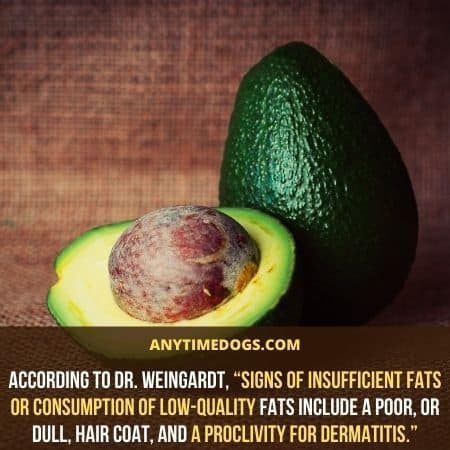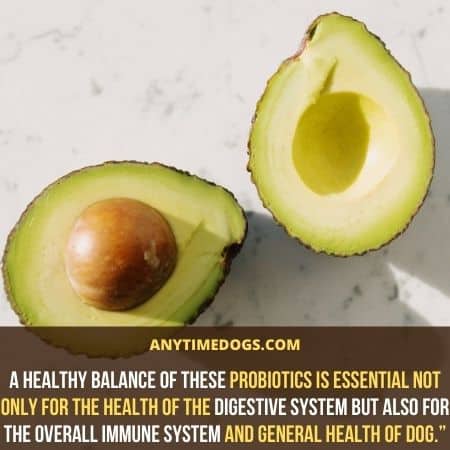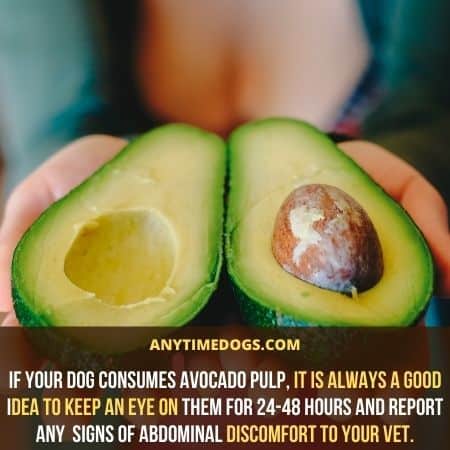Avocado is currently one of the most popular health foods in the market. They are marketed as a healthy and tasty snack for humans, but what about our four-legged friends? Can Dogs Eat Avocado? Yes, but in a moderate amount.
Avocados contain persin, and it can cause serious health problems in your dog. Veterinarians say dogs are more resistant to persin than other animals, but that doesn’t mean avocados are completely safe for your dog to eat.
You should not give avocado leaves, skin, or pit to your dog. A few thin slices of fresh avocado over your dog’s dinner or as a nutrient-rich treat, on the other hand, will be fine, unless he has a food allergy to it.
In this article, we will study whether avocado is safe for your dog or not. But before, read about dogs having cream cheese, sour cream, Cheetos, caramel, and corned beef.
Can Dogs Eat Avocado? Benefits of Eating Avocado
Yes, dogs can eat avocados because small amounts of avocado fruit will not harm your dog. Avocados have many health benefits for dogs, including healthy fats and fatty acids, vitamins, minerals, and anti-inflammatory properties.
Avocado is listed as an ingredient in some brands of dog food. Your dog will be fine as long as you don’t give him too many avocados at once and make sure he avoids the other parts of the plant as well as the bottom.
Dr. Keith Weingardt, helped us highlight five reasons why avocado is healthy, natural, and safe for your dog’s diet.
1.1. Proteins:
Avocado is an excellent source of dietary proteins. They contain more proteins and less sugar that is beneficial for your dog. The proteins provided in avocado are more easily absorbed by the dog’s body and contain very little cholesterol and sodium.
1.2. Fatty-Acids:
Fats are essential for canine health because they are the primary source of energy and helps in the maintenance of the body. Avocados are high in fats, which are beneficial to the skin of dogs.

According to Dr. Weingardt, “signs of insufficient fats or consumption of low-quality fats include a poor, or dull, hair coat, and a proclivity for dermatitis.”
1.3. Nutritions:
Avocados are high in nutrients that are necessary for the development and maintenance of a healthy body of your pooch. “Providing nutrient-dense foods in a dog’s diet helps to fill a lot of holes and gaps in the nutrient profile of processed pet food,” says Dr. Weingardt.
1.4. Vitamins:
Avocado contains vitamins that are beneficial for your dog’s health. A list of vitamins available in avocado is following:
- Vitamin B5 is required for the synthesis of proteins, fats, and carbohydrates. Dogs who are deficient in vitamin B5 have low energy, are fatigued, and are stressed.
- Vitamin B6 is essential for the metabolization of amino acids, carbohydrates, and fatty acids. Dogs with vitamin B6 deficiency can develop severe anemia, which can lead to death, especially in growing puppies.
- Vitamin C is essential for maintaining a healthy immune system and increasing disease resistance. It may also aid in the relief of sore joints in rapidly growing puppies.
- Vitamin K produces blood-clotting agents in the liver. Increased blood-clotting time and hemorrhage are symptoms of deficiency.
1.5. Fiber:
Fiber is essential in the canine digestive system because it maintains the balance of healthy organisms that populate the digestive tract. “Avocado is a fantastic prebiotic,” says Dr. Weingardt.
“It is a substance that serves as a food source for the millions of bacteria that live in the intestine.

A healthy balance of these probiotics is essential not only for the health of the digestive system but also for the overall immune system and general health of your dog.”
Why Avocado Is Bad for Your Dog?
The flesh is the least dangerous part for your dog, but it is not without risk. Pet owners should avoid feeding large amounts of avocado flesh and never feed other parts of the fruit because they can cause toxicity or pose other health risks due to their high-fat content and pit size.
Always consult your veterinarian before feeding avocados or other human foods to your pet.
2.1. Risk of Allergies:
Avocados may cause allergic reactions in your dog. Stop feeding avocado to your pet if you notice symptoms such as sneezing, coughing, hives, diarrhea, or itchy rashes, and contact your veterinarian.
An allergic reaction to avocado can result in anaphylaxis. Swelling, hives, and difficulty breathing are all symptoms of a severe allergic reaction and should prompt you to seek emergency veterinary care.
2.2. Avocado Pit:
When you feed avocados to your dog, there is a risk, but it is not with the skin or the meat; it is with the pit! The pit of avocado does not digest well in a dog’s digestive tract and may cause a gastric or intestinal blockage.
If a dog eats an avocado, the pit will become lodged partway through the intestinal tract. If this occurs, the only treatment is to go in and surgically remove it, just like a rock, rubber ball, or another indigestible object.
2.3. Avocado Pulp:
Even though there is no known toxicity for dogs, we do know that sensitive dogs can develop pancreatitis even if only a small amount of avocado pulp is consumed.

If your dog consumes avocado pulp, it is always a good idea to keep an eye on them for 24-48 hours and report any vomiting, diarrhea, or signs of abdominal discomfort to your veterinarian.
Can Dogs Eat Avocado? Conclusion:
Can dogs eat avocado? Yes, dogs can eat avocado in a small moderate amount. Avocados contain many health benefits for your pooch and can be a great fruit for him. But on the other hand, it can also be harmful, as it contains persin and it can cause damage to your dog’s body.
When feeding avocado to your pet, make sure to avoid giving him avocado’s pit, pulp, and leaves. If your dog consumes them, take him to the vet.


Thankyou for this
I am happy that you like it. Thank you 🙂